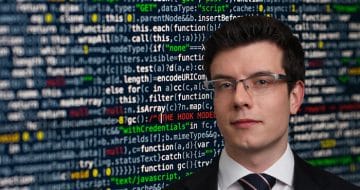Legal Cheek Careers chats with Jamie Ball, AI lawyer at Herbert Smith Freehills Kramer, about his journey from techie to AI law innovator and how the firm is embracing AI and trainee-led innovation

“I started very much as a techie and learnt to code very young,” recalls Jamie Ball, a manager/associate in Herbert Smith Freehills Kramer’s digital legal delivery team. He built websites and apps in his youth before a brush with contract law piqued his interest in the legal world. It was a client dispute, back when he “didn’t even know what a contract was,” that first sparked his curiosity about law.
After pursuing a law degree, Ball found what he describes as a “lovely compromise between doing law and tech” at a major law firm. Fast forward a few years, and he qualified into what was then HSF Kramer’s digital law group — an early effort to merge technology with legal practice. “Basically, mixing law and tech as much as possible,” is how he sums up his work today.
Now, Ball operates at the forefront of the firm’s digital legal delivery practice, a multidisciplinary team with two main focuses. One is advising the firm’s clients, often in-house legal teams, on improving how they deliver legal services. Another is helping organisations adopt and manage emerging technologies. Ball’s focus lies “mostly in the second of those two,” spending most of his time advising clients on launching tech products and on AI governance, risk and compliance. In essence, “most of my day-to-day now is helping clients harness AI responsibly,” he explains.
No two days are ever the same. One might see him advising a large financial institution on a thorny AI compliance issue, while another involves helping shape a client’s own tech strategy. Whatever the task, it’s a highly collaborative role that draws on expertise from across the firm. “We bring together relevant expertise from all over the firm,” he says, whether that’s intellectual property, contracts or employment law.
“For me, it’s getting into the weeds of fascinating tech and understanding how that’s going to work for a client and what they want to do with it,” Ball says when asked what he finds most rewarding. Often that means sitting down with a client’s tech teams as well as their lawyers, really “getting hands-on with what the client is trying to achieve, rather than just the legal problem they’ve come to us with”. Clients might ask, — “we have this great AI idea, can we do it?” — and helping them get to “yes” means digging into the intersection of business, technology and law. “That’s the fun bit. It’s that process of translation,” he smiles.
From the start, HSF Kramer was keen to nurture Ball’s tech-law interests. “Throughout the past six and a half years, it has always seemed to be a collaborative effort of ‘where do I see things going? And how can the firm harness that for the benefit of both them, me and clients?’” he says. The firm has long embraced a “continuous drive for efficiency” and encouraged him to explore how emerging technologies could make legal services smarter and faster. This supportive environment, he notes, “made this journey much more interesting and exciting.”
Asked how HSF Kramer uses AI internally, Ball says the firm takes “a fairly impressive and responsible approach,” underscored by its recent hire of Ilona Logvinova as its Chief AI Officer. Despite the rapid pace of AI’s development, he explains that its use in the legal sector as a whole has tended to lag behind the development of the technology due to higher risk profiles. Mistakes in legal services carry significant consequences and are harder to detect. He draws a comparison with AI “pair programmers” in coding, which are now “absolutely fantastic”, and if they make an error, it’s often easier for a human to spot and fix it. “The issue with having the same approach for law is it’s often a lot harder to detect and test how AI has been used in producing English prose,” he explains. AI might easily draft an advice note or contract, but the margin for risk is much higher. “The review must be more rigorous, and the process defined more clearly, before you even add the risk that this is legal advice. It’s not a vending machine game that you’re making here,” he stresses.
HSF Kramer has rolled out a mix of in-house and third-party AI tools, piloting several across the firm. Ball recalls one such pilot where there was a tool the firm tested which seemed “very impressive” but “once lawyers started using it, they just weren’t engaging with it.” Rather than forcing adoption, the firm examined why. “They looked at it and said, ‘why is nobody using it? It’s clearly impressive.’” Either they could encourage use, or work out “what the lawyers didn’t want, and what instead they did want.” By listening to this feedback, HSF Kramer refined its approach, and “the results are becoming far more impressive,” Ball tells us.
Ultimately, the success of any new technology depends on people. “I think this is far less about technology than it is about people,” Ball says. HSF Kramer has focused on fostering a culture of openness and curiosity around innovation. That starts with finding and supporting those across the firm who embrace new tools. “I’ve been particularly impressed by the trainees,” he says. “They’re innovative-minded and tech-enabled. They can look at a piece of technology, play with it, and say, ‘oh, we could do this with this.’”
Insight from trainees and junior lawyers is therefore crucial when introducing new tech. “When you create that culture of communicating, of ‘this works, we can do this better by doing that’ suddenly the value you get from the technology skyrockets,” he says.
Trainees at HSF Kramer aren’t just passive users of new tech — they help shape it. “The efficiency gains are just incredible,” he says. It also showed that the firm listens to its junior lawyers. “You have to be open, because often the trainees are the ones who have the freshest perspective,” he comments.
So what makes a trainee thrive in this kind of tech-driven legal environment? Surprisingly, it’s not coding skills. “About three or four years ago, the conversation was, do trainees need to learn to code? My answer was always no,” he says. “Now the conversation has shifted to whether they need to learn AI tools before joining the firm. Again, my answer is no.” What matters most is attitude. “The thing that really stands out to me is when trainees have an aptitude and willingness to engage with new ways of working,” he explains. They don’t need to be experts from day one — curiosity and openness go much further. “It doesn’t matter if they don’t know how to operationalise the tech. We have teams that can do that,” he adds. Still, he cautions that innovation must never eclipse black-letter law. “None of this supersedes technical ability as a lawyer,” he says firmly.
Alongside his internal innovation work, Ball advises a range of high-profile clients. “Most of my clients are tech companies and large financial institutions,” he says, often major players in crypto or AI. Many come to HSF Kramer eager to harness AI but lack a clear framework to do so safely. “Anyone can just buy some tech and start using it,” he notes, “but to succeed, you need much more around it.” That includes a solid strategy, the right team structure and buy-in, robust policies and risk processes. His team often helps draft governance policies, set up oversight committees, vet AI vendors and advise on marketing claims for AI products.
As our conversation wraps up, Ball reflects on the challenges clients face in the AI space. There’s a fundamental tension, he says. On one hand, the “carrot” is the vast potential of AI. On the other, the “stick” is the rapid arrival of regulation, such as the EU AI Act. “Technology comes out, there’s plenty of innovation, then regulators catch on and decide how to regulate it — and each country takes a totally different approach,” he explains. Companies want to seize the AI opportunity before competitors do, but they also worry about compliance as new laws take shape. Much of Ball’s work helps clients navigate this balance. Often, regulatory requirements are what push a company to take its AI strategy seriously. But ticking the compliance boxes is only part of the picture. Ultimately, every business adopting AI must answer two key questions: “How do we get the value? And how do we get that value in a compliant and responsible way?”
Jamie Ball will be speaking at ‘Advising in the age of AI — with Herbert Smith Freehills Kramer’, a virtual student event taking place THIS WEDNESDAY (12 November) from 4pm to 6pm. Secure one of the final few places.
View this post on Instagram
About Legal Cheek Careers posts.


